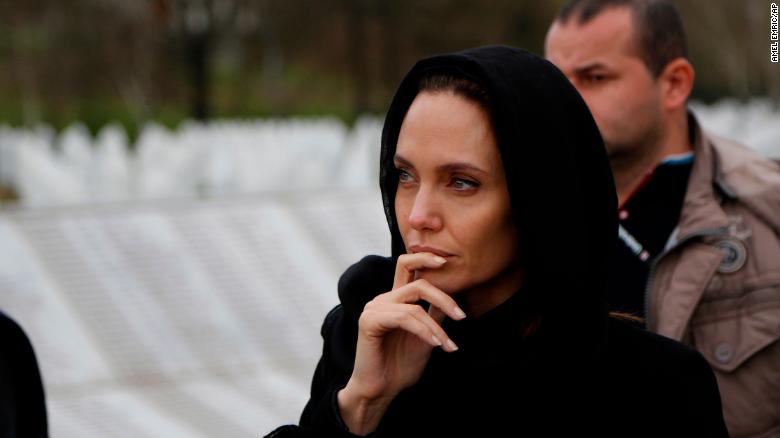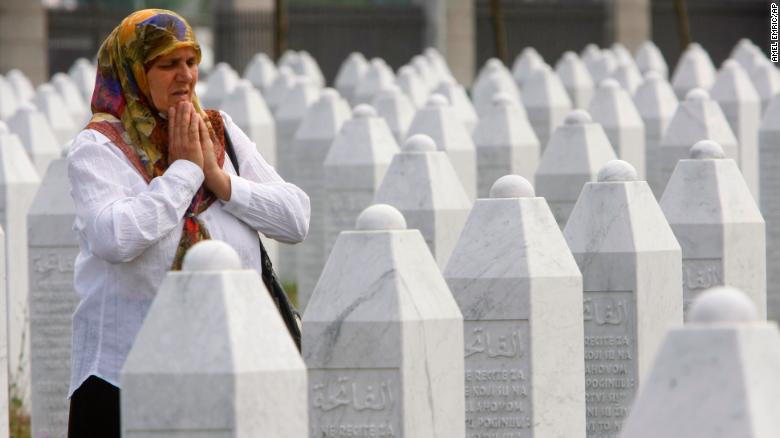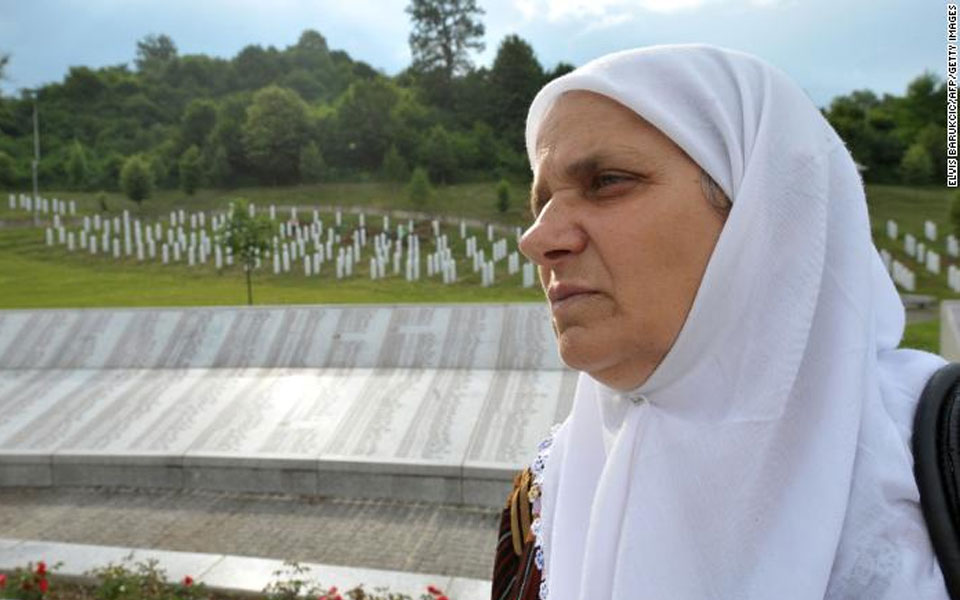News came today that Hatidža Mehmedović, who survived the war in Bosnia and led the Association of the Mothers of Srebrenica, had died in a hospital in Sarajevo.
I met Hatidža four years ago when I visited the Srebrenica Memorial, where the victims of the genocide -- the worst massacre on European soil since the Holocaust -- are buried. I remember it vividly. Sitting in a circle of other bereaved and widowed mothers of Srebrenica, quietly and with the utmost dignity, she told her story.

(Angelina Jolie visits the memorial center of Potocari near the eastern Bosnian town of Srebrenica in 2014.)
She painted a picture of life before the war, with her husband Abdullah and their two sons Azmir and Almir, who were 21 and 18 years old. She described the terrible days in July 1995, when they were forcibly separated from her and sent to their deaths, along with at least 8,000 other innocent men and boys. As well as her husband and sons, Hatidža lost her father, her two brothers, and scores of her extended family members.
Those who carried out the genocide went to considerable lengths to conceal or destroy the bodies of the victims. For 15 years, Hatidža searched for the remains of her family. She was one of the first survivors to return to Srebrenica. She lived bereaved and alone, facing threats and intimidation, in a climate of persistent attempts to deny the genocide.
She told me that when they finally found the remains of her husband and two sons, all she received to bury of Almir, her youngest, were two small leg bones. Instead of dwelling on the heartrending pain of that moment, she simply told me that she was fortunate. Many mothers, she said, still lacked even that small consolation.

(Hatidza Mehmedovic at the Potocari memorial center near Srebrenica.)
In many ways, Hatidža Mehmedović reminded me of the other Bosnian women I have met who survived the war, for the way she combined deep strength and resilience with tolerance and humility and a refusal to succumb to hate.
But Hatidža was also exceptional. For 23 years she was a tireless seeker of truth and justice. She never claimed any special status, but spoke on behalf of all the Mothers of Srebrenica. She did not distinguish between the victims, but regarded them as all equally worthy of dignity and recognition. Even as her health failed, she worked to organize aid convoys to take food and medicine to refugees in Syria. She died before her time, at just 65 years old, her death no doubt sadly hastened by all she had endured.
It is testimony to the depth of Bosnia's wounds that Hatidža did not live to see the end of the fight for justice and security for the survivors of Srebrenica. Others must take forward the burden she carried for so many years. But her example will live on, in the memories of all who knew her, and in the stories that we should all tell, wherever we live, so that the memory of Srebrenica never fades.
While her death fills me with sadness and regret for all the victims of the war in Bosnia-Herzegovina, I am sure that I am not alone in remembering Hatidža with gratitude and awe.
There are times to dwell on the many lessons of the Srebrenica genocide, and where violent hatred toward any group or people can lead. But as Hatidža is laid to rest and mourned by her country, it feels like a moment to reflect on the power of a single individual life.
Hatidža Mehmedović lived an honest life. She never allowed anyone to frighten her or to corrupt her sense of truth and fairness. We too may never see justice in our lifetimes, but we cannot go wrong if we follow her example.
Editor's Note : Angelina Jolie is an actor, director, special envoy for the UN Refugee Agency and co-founder of the Preventing Sexual Violence Initiative.
courtesy : cnn.com
Let the Truth be known. If you read VB and like VB, please be a VB Supporter and Help us deliver the Truth to one and all.
Ottawa (PTI): Three Indian nationals have been arrested by Canadian police on an anti-extortion patrol and charged after bullets were fired at a home.
Harjot Singh (21), Taranveer Singh (19) and Dayajeet Singh Billing (21) face one count each of discharging a firearm, and all have been remanded in custody until Thursday, the Surrey Police Service (SPS) said in a statement on Monday.
The suspects were arrested by patrol officers after an early morning report of shots fired and a small fire outside a home in Surrey's Crescent Beach neighbourhood, the LakelandToday reported.
On February 1, 2026, the SPS members were patrolling in Surrey’s Crescent Beach neighbourhood when reports came in of shots being fired and a small fire outside a residence near Crescent Road and 132 Street.
The three accused were arrested by SPS officers a short time later, the statement said.
SPS’s Major Crime Section took over the investigation, and the three men have now been charged with Criminal Code offences, it said.
All three have been charged with one count each of discharging a firearm into a place contrary to section 244.2(1)(a) of the Criminal Code.
The investigation is ongoing, and additional charges may be forthcoming. All three have been remanded in custody until February 5, 2026.
The SPS has confirmed they are all foreign nationals and has engaged the Canada Border Services Agency, it said.
One of the suspects suffered injuries, including two black eyes, the media report said.
Surrey police Staff Sgt. Lindsey Houghton said on Monday that the suspect had refused to comply with instructions to get out of the ride-share vehicle and started to "actively resist."
"As we were trained, he was taken to the ground and safely handcuffed," said Houghton.
A second suspect with a black eye was also injured in the arrest after refusing to comply, Houghton said.
The arresting officers were part of Project Assurance, an initiative that patrols neighbourhoods that have been targeted by extortion violence.
Houghton said the Canada Border Services Agency (CBSA) is also involved because the men are foreign nationals, and the trio may face additional charges.
It's not clear if the men are in the country on tourist visas, a study permit, or a work permit, but Houghton said CBSA has started its own investigation into the men's status.
Surrey has seen a number of shootings at homes and businesses over the last several months, but there's been an escalation since the new year.





